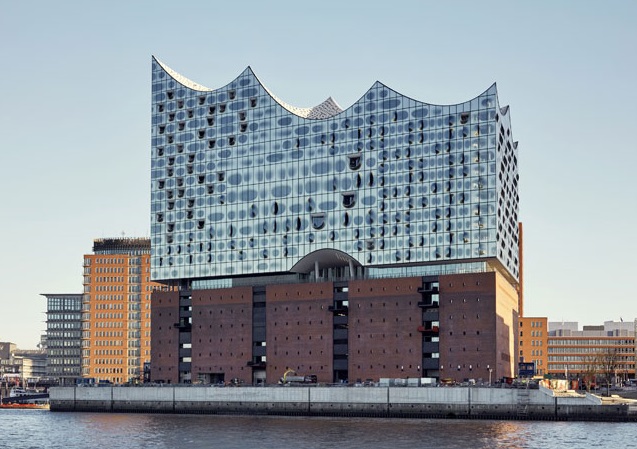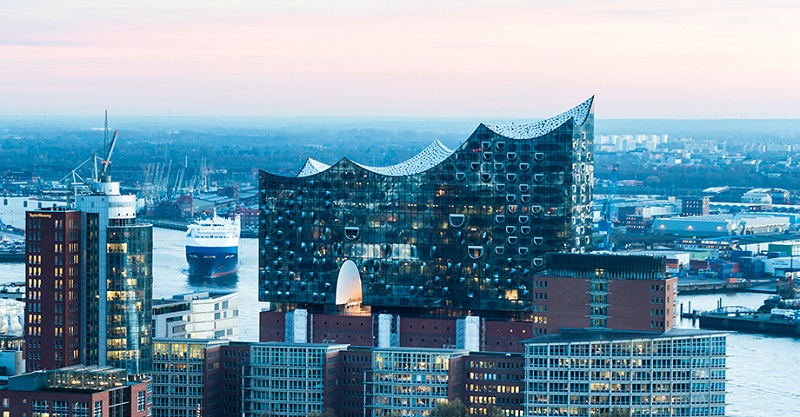Elbphilharmonie Hamburg
The Elbphilharmonie is a concert hall in the HafenCity quarter of Hamburg, Germany, on the Grasbrook peninsula of the Elbe River. It is one of the largest and most acoustically-advanced concert halls in the world.
Having first been proposed in 2003, it was only completed in 2016 and was officially inaugurated with concerts and a lightshow on 11 January 2017.
Designed by Swiss architectural practice Herzog & de Meuron, the building comprises a large, quartz-like glass structure sitting on top of an existing brick warehouse. With a maximum height of 108 m (354 ft), it is the tallest inhabited building in Hamburg.
The structural strength of the old warehouse was enhanced to bear the weight of the new addition, which is identical in plan form but rises up like a wave from the eastern to western end. The glass façade, consists of flat, curved, and 'carved' open panels, and can have images projected onto it. The façade also changes appearance during the day through its reflection of the sky, water and surrounding city.
The building complex contains a philharmonic hall, a chamber music hall, restaurants, bars, residential apartments, a hotel, and a terrace with panoramic views of Hamburg.
[edit] Find out more
[edit] Related articles of Designing Buildings Wiki
Featured articles and news
Inspiring the next generation to fulfil an electrified future
Technical Manager at ECA on the importance of engagement between industry and education.
Repairing historic stone and slate roofs
The need for a code of practice and technical advice note.
Environmental compliance; a checklist for 2026
Legislative changes, policy shifts, phased rollouts, and compliance updates to be aware of.
UKCW London to tackle sector’s most pressing issues
AI and skills development, ecology and the environment, policy and planning and more.
Managing building safety risks
Across an existing residential portfolio; a client's perspective.
ECA support for Gate Safe’s Safe School Gates Campaign.
Core construction skills explained
Preparing for a career in construction.
Retrofitting for resilience with the Leicester Resilience Hub
Community-serving facilities, enhanced as support and essential services for climate-related disruptions.
Some of the articles relating to water, here to browse. Any missing?
Recognisable Gothic characters, designed to dramatically spout water away from buildings.
A case study and a warning to would-be developers
Creating four dwellings... after half a century of doing this job, why, oh why, is it so difficult?
Reform of the fire engineering profession
Fire Engineers Advisory Panel: Authoritative Statement, reactions and next steps.
Restoration and renewal of the Palace of Westminster
A complex project of cultural significance from full decant to EMI, opportunities and a potential a way forward.
Apprenticeships and the responsibility we share
Perspectives from the CIOB President as National Apprentice Week comes to a close.
The first line of defence against rain, wind and snow.
Building Safety recap January, 2026
What we missed at the end of last year, and at the start of this.























